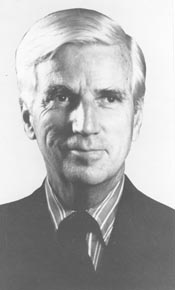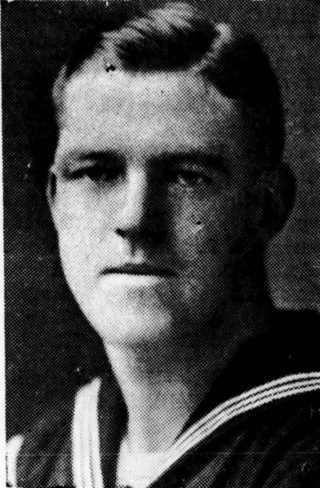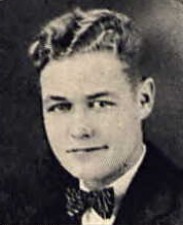Related Research Articles

Bruce George Sundlun was an American businessman, politician and member of the Democratic Party who served as 71st governor of Rhode Island between 1991 and 1995.

Robert Brown Potter was a United States lawyer and a Union Army general in the American Civil War.

Jonathan Brewster Bingham was an American politician and diplomat. He was the US delegate to the United Nations General Assembly and was elected to Congress from The Bronx, serving in the House of Representatives from 1965 to 1983.

The Brownsville affair, or the Brownsville raid, was an incident of racial discrimination that occurred in 1906 in the Southwestern United States due to resentment by white residents of Brownsville, Texas, of the Buffalo Soldiers, black soldiers in a segregated unit stationed at nearby Fort Brown. When a white bartender was killed and a white police officer wounded by gunshots one night, townspeople accused the members of the African-American 25th Infantry Regiment. Although their commanders said the soldiers had been in the barracks all night, evidence was allegedly planted against the men.
Keats E. Petree was an American illustrative artist with significant contributions to both pulp magazines and comic strips in the 1940s and 1950s. His works were primarily in color, as inked strips and both oil and watercolor paintings. Petree's most memorable comic book credits were for the later comic versions of Sally the Sleuth, a pulp comic strip heroine created originally by Adolphe Barreaux in 1934 in Spicy Detective Stories, but his greatest recognition was earned by his pulp color work for the Queenie Starr series, also in Spicy Detective Stories. Other notable Petree work included The Lone Ranger (Dell/Western), Girl Friday (Trojan), the Sally the Sleuth pulp installment entitled Blonde Decoy, Wilma West: The Range Runs Red, a daily strip and Sunday strip in the fifties, Nick Haliday, and a wide variety of other pulp and comic issues. He also produced an undetermined number of non-genre oil and watercolor paintings.

The Connecticut Air National Guard (CT ANG) is the aerial militia of the State of Connecticut, United States of America. It is, along with the Connecticut Army National Guard, an element of the Connecticut National Guard.
Gottfried Emanuel Noether was a German-born American statistician and educator; one of the third generation of a famous family of mathematicians: he was the son of Fritz Noether and nephew of Emmy Noether, the grandson of Max Noether, and brother of chemist Herman Noether. He died in Willimantic, Connecticut.

Leonard Fish Wing Sr., nicknamed "Red", was a Vermont political figure and a division commander in the United States Army during World War II.
Service numbers were used by the United States Army from 1918 until 1969. Prior to this time, the Army relied on muster rolls as a means of indexing enlisted service members while officers were usually listed on yearly rolls maintained by the United States War Department. In the nineteenth century, the Army also used pay records as a primary means of identifying service members after discharge.

First Sergeant Mosheim Feaster was an American soldier in the U.S. Army who served with the 7th U.S. Cavalry during the Indian Wars. He was one of twenty men awarded the Medal of Honor for extraordinary gallantry at the Battle of Wounded Knee, but now called the Wounded Knee Massacre, on December 29, 1890. He later served in the Spanish–American War.

Robert Milchrist Cannon was a United States Army lieutenant general. He was notable for his World War II service in the China Burma India Theater and his command of the Sixth United States Army.

Gonzalo Edward Buxton Jr. was a colonel in the American Expeditionary Force in World War I and the commanding officer of Sergeant Alvin C. York. In later life he was the first assistant director of the OSS.

Richard Gordon was an American actor in vaudeville and films and on stage and radio. He was perhaps best known for portraying the title role in the radio version of The Adventures of Sherlock Holmes.

Royal Bertrand Lord was a United States Army general who served in World War II.

Gardner Dow was an American college football player for the Connecticut Aggies. He died of traumatic brain injury sustained in a game against the University of New Hampshire. Connecticut Agricultural College named its athletic field in his honor. The Gardner Dow Field served as the football team's home pitch for decades.

John Vivyan was an American stage and television actor, who was best known for portraying the title character in the television series Mr. Lucky.
Lemuel Rodney Custis was a U.S. Army Air Force officer, combat fighter pilot and Squadron Operations Officer with the 332nd Fighter Group's 99th Fighter Squadron, best known as the Tuskegee Airmen. He was one of the 1,007 documented Tuskegee Airmen Pilots.

Francis Henry "Fran" Horn (1908-1999) was an American educator with expertise in English literature and higher education who served as a university administrator at several institutions in the Eastern United States, and served as president of several colleges and universities, including the Pratt Institute from 1953-1957, the University of Rhode Island (URI) from 1958 to 1967, Albertus Magnus College from 1968-1970, and the American College of Switzerland from 1972-1975. While serving as president of the University of Rhode Island, he oversaw the founding of two graduate schools, the Graduate Library School and the Graduate School of Oceanography, as well as the establishment of the URI Faculty Senate, and he managed rapidly increasing student enrollments and ambitious building projects on the URI campus. Despite his success in guiding the numerous building projects and building the national and international reputation of the university, he fell into political disfavor with the university's board of trustees primarily for his political aspirations, leading to his forced resignation from URI in 1967. Horn was elected as a member of the Rhode Island Heritage Hall of Fame in 1967, and he spend his retirement years after 1983 at his home in Kingston near the URI campus.
Agnes Grace Doody, Ph.D. was an academic primarily in the field of speech communication and faculty member for 45 years at the University of Rhode Island who was engaged in philanthropy and civic engagement locally and around the State of Rhode Island.
References
- ↑ New York State Department of Health; Albany, NY, USA; New York State Birth Index
- 1 2 Social Security Administration; Washington D.C., USA; Social Security Death Index, Master File
- ↑ Hartford Courant; Publication Date: 24 Jun 1936; Publication Place: Hartford, Connecticut, USA
- ↑ Who's Who in the East. 15th edition, 1975-1976. Wilmette, IL: Marquis Who's Who, 1975.
- ↑ Electronic Army Serial Number Merged File, 1938-1946. NAID: 1263923. World War II Army Enlistment Records; Records of the National Archives and Records Administration, Record Group 64; National Archives at College Park. College Park, Maryland, U.S.A.
- ↑ Rhode Island, U.S., Historical Cemetery Commission Index, 1647-2008 [database on-line]. Provo, UT, USA: Ancestry.com Operations, Inc., 2016.
- ↑ University of Rhode Island Yearbook, 1947, Kingston Rhode Island
- ↑ "Facilities: Robert E. Will Theatre" . Retrieved 16 November 2023.